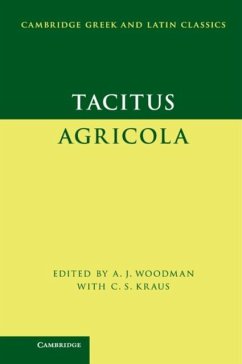The first work of any great historian has always commanded attention, and Tacitus was ancient Rome's very greatest historian. His biography of his father-in-law, governor of Britain in the years AD 77-84, is a literary masterpiece: it combines penetrating political history with gripping military narrative and throughout poses the question (still very much alive today) of how one should live one's life under a tyranny. This is the first commentary in English on the Agricola for almost half a century: in keeping with the aims of the series, particular attention is paid to the understanding of Tacitus' Latin, but a whole range of generic, historical, textual and narrative topics is covered, and it will be suitable for advanced undergraduates and graduate students as well as scholars. Tacitus' Agricola remains a key text for anyone with an interest in Roman Britain as well as ancient biography.
Dieser Download kann aus rechtlichen Gründen nur mit Rechnungsadresse in A, B, BG, CY, CZ, D, DK, EW, E, FIN, F, GR, HR, H, IRL, I, LT, L, LR, M, NL, PL, P, R, S, SLO, SK ausgeliefert werden.


